
Gritty crime drama: The film addresses the themes of migration, vulnerability of the poor and human rights violations
Saibal Chatterjee
In writer-director Vetrimaaran’s own words, Visaranai (Interrogation), India’s official Oscar submission for the year, is “a depiction of a harsh reality we do not want to believe”.
Police brutality, especially against those who are poor, weak and defenceless, is a fact of life in India. Visaranai tackles that theme in a style that is as disturbingly stark as it is numbingly chilling.
The Film Federation of India (FFI), which selects India’s Oscar submission and often makes a bizarre pick, cannot be faulted this time around. Visaranai is as strong a film as any made in India last year.
Visaranai is a gritty, hard-hitting drama about four impoverished Tamil migrants, who are brutalised by the police in the Andhra town of Guntur into confessing to a crime they never committed.
These migrants survive on the fringes. They sleep in a park and do odd jobs. They are sitting ducks for the police when a powerful man’s home is burgled and the law enforcers are under pressure to quickly close the case.
Visaranai is partly based on Lock-Up, an autobiographical novel by Coimbatore-based auto-rickshaw driver M. Chandrakumar, whose pseudonym is Auto Chandran.
Some years ago, Chandran and his friends were hauled up by the cops in Guntur on a trumped up charge and subjected to intense torture. He survived and decided to write about the horrifying experience.
When Visaranai was selected for the Orizzonti (Horizons) section of the 2015 Venice Film Festival, Vetrimaaran took Chandran along for the world premiere. “Says the director: “He had to be there. He was happy that the film would now take his cries beyond the prison walls. That hope was the driving force behind the film.”
Does Visaranai stand a genuine chance at the Oscars against such frontrunners as Maren Ade’s Toni Erdmann (Germany), Pedro Almodovar’s Julieta (Spain) and Pablo Larrain’s Neruda (Chile)?
Its Kafkaesque tale is universal, and so is its austere style.
Visaranai addresses the themes of migration, the vulnerability of the poor and human rights violations and all of these have global relevance. It might not be all that difficult for the Academy voters to relate to the film’s concerns.
What might, however, work against Visaranai is its lack of resources. It would need to be aggressively promoted in the lead-up to Oscar night and that isn’t possible without sizeable funding.
Last year, Chaitanya Tamhane’s critically acclaimed Marathi film Court, which, too, had its world premiere in the Venice Orizzonti in 2014, was India’s official submission for the best foreign language film Oscar.
The powerful but minimalist courtroom drama that drew attention to the weird ways of the country’s legal system was widely seen as a wise choice. But the small, independent film made no headway in the Oscar race. Will Visaranai meet the same fate?
If it does become only the fourth Indian film ever to make it to the Oscar nominations — after Mother India, Salaam Bombay and Lagaan — it would be quite a leap. Visaranai got made only as an afterthought.
“Every film that I make is an accident,” says Vetrimaaran. The star of the director’s under-production Vada Chennai, Dhanush, who is incidentally the producer of Visaranai, had to take time off from Chennai in order to complete a Bollywood film.
That left Vetrimaaran with nothing to do for nearly six months. Instead of sitting idle waiting for Dhanush’s return, he decided to film Visaranai and wrapped up the shoot in 42 days.
“I went to the set without a screenplay and the film evolved organically,” says Vetrimaaran. “I allowed the actors to improvise and react to situations. I did not want them to act.”
The power of Visaranai stems primarily from its spontaneity and refusal to make any concessions to popular tastes. It pulls no punches and ensures that every blow lands on target. Not an easy watch, Visaranai shows the ugly face of a corrupt system that draws sustenance from a deep nexus between the police and their political masters.
“Visaranai isn’t for those with weak hearts,” says Vetrimaaran. “It has a lot of graphic violence, and you need a strong stomach to watch the film.”
The FFI’s selection of Visaranai this year — and that of Court in 2015 — augurs well for an exercise that has long been mired in controversy. In the past, FFI has sent commercial films like Saagar, Paayal Ki Jhankaar, Henna, Jeans, Eklavya — The Royal Guard and Rang De Basanti to the Oscars.
But since opting for Paresh Mokashi’s Harishchandrachi Factory in 2009, it has done infinitely better, with titles like Peepli Live and Abu, Son of Adam earning its nod. Of course, in 2013, it goofed up big time by submitting The Good Road instead of The Lunchbox. With Visaranai, which edged out big commercial successes like Bajirao Mastani and Sairat, FFI now has a chance to make amends for its 2013 fiasco.


























